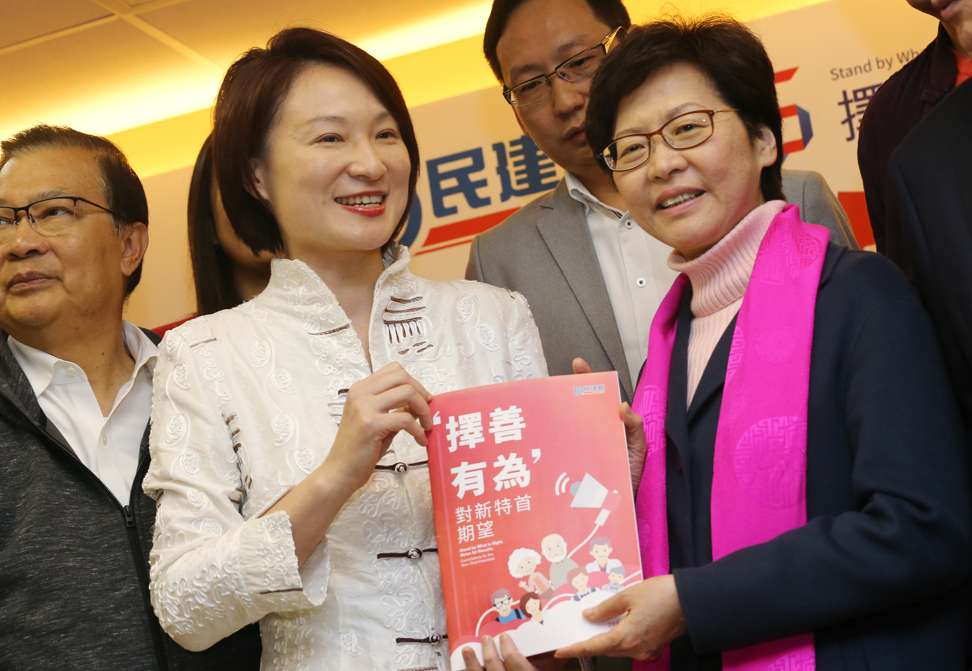
How Carrie Lam can put the destiny of Hong Kong in safe hands
Regina Ip points out that controversial ministers and the accountability system have been a drag on the current administration, and calls for more able replacements if the incoming government is to achieve its goals
Any organisation is only as strong as the people who lead it. In the past, Hong Kong won much kudos for the high quality of its civil service. Their reputation was so high that senior civil servants were prime targets of the united front efforts of the New China News Agency, then the unofficial representatives of the central government in Hong Kong.
Beijing authorities set such great store by retaining the British-trained senior civil servants that all of those at ministerial level were put on the “through train” of service in the Hong Kong special administrative region as principal officials.
Shake up of Hong Kong’s ministerial system proposed
Many [civil servants] have proved to be adaptive and resilient, with a knack to move across different policy areas with competence
In comparison, the new generation of political appointees have a much less impressive survival rate. Since 2002, few have worked beyond one term.
One of the best-known examples, high-profile financial heavyweight Antony Leung Kam-chung, actually served as financial secretary for two years only, from May 2001 to July 2003.
Hong Kong chief executive-elect Carrie Lam ‘working around the clock’ to find ministers
Every administration since 2002 has seen a turnover of large numbers of cabinet members. Many in the current administration have declared their intention to step down. The accountability system, which has provided flexibility to bring in newcomers, equally provided flexibility for senior civil servants to bow out. As civil servants can “cash in” on their appointment (that is, collect their pension on changing their status from civil servant to political appointee), several chose to quit the public service after a stint as principal officials.

[Many] would not have reached the upper echelons of government without the alternative route offered by the accountability system
In their place, many had been brought in and had proved to be round pegs in square holes – misfits who would not have reached the upper echelons of government without the alternative route offered by the accountability system.
In fact, it is widely recognised that the current administration has been plagued by the large numbers of controversial “ministers” who have been a drag on the effectiveness and popularity of the government. It is difficult to see how the next administration could perform better without more able replacements, even if Carrie Lam is willing to give the city all the energies she can muster.
Despite daily reports of elites in the business or professional sectors turning down Lam’s invitations to serve in her cabinet, some political parties seem ever more ready to send her a long list of public office aspirants from their motley crew of district councillors and office-bearers.
The enthusiasm to serve is not hard to understand. An undersecretary is paid HK$193,775 to HK$223,586, depending on experience and qualifications. A political assistant is paid HK$104,340, almost three times the take-home pay of a district councillor. Add to that the newfound glory of riding in official cars and hobnobbing with people of much higher social status and real power.
Why is Hong Kong still giving out colonial-era perks to its civil servants?
Small wonder that Starry Lee Wai-king, the chairwoman of the Democratic Alliance for the Betterment and Progress of Hong Kong, said that she was ready to present Lam with a long list.
Nothing wrong with giving the victor the spoils, and never mind the much fatter pay the new appointees will get. But even if more inspiring leaders could not be found, the least that we want is our destiny in safe enough hands.
Regina Ip Lau Suk-yee is a lawmaker and chairwoman of the New People’s Party

